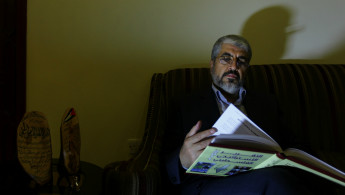Hamas and an era of uneasy alliances
Yet this contradicted Hamas sources, who reported that the meeting was political in nature.
Speaking at a ceremony in Doha last week, Hamas' leader Khaled Meshaal said that Hamas would talk to all parties, "for the sake of Palestine and Jerusalem", and that Hamas did not engage in "axis gimmicks".
"We opened a new page in the relationship with the leadership of the Kingdom," Meshaal said, referring to Saudi Arabia.
However, the recent statements by Saudi show that, although the Kingdom under the new rule of King Salman is cautiously adopting a more open position towards Hamas and Muslim Brotherhood groups, including freeing eight Hamas prisoners as a goodwill gesture, they still remain incredibly cautious.
The recent deal between Iran and the US has led Saudi Arabia to shore up and form alliances. Some are now saying that Saudi is nurturing a "Sunni-aligned coalition", reflecting Hamas’ attempt to shore up relations with Turkey, Saudi and Egypt, with Meshaal being based in Qatar.
However, Saudi Arabia's foreign policy is also evolving outside the region. A nuclear deal with Russia - Iran's ally - in June, saw the oil ministers of both countries discussing a "broad cooperation agreement" as well as Iran.
Additionally, with the end of sanctions expected to allow Iran to massively increase its oil output, and Iran's reported co-ordinated oil strategy with Iraq, one of the largest oil producers in the region, economic competition between Iran and Saudi Arabia over oil prices is almost certain to increase.
Considering this back-drop, and although many point out the sectarian nature of Riyadh's foreign policy, as evidenced in the 'Saudi cables' for example, any Saudi attempts to shore up alliances are also likely to also be driven by economic concerns.
In the wake of the Iran deal, economic interest is also an aspect that Hamas is considering, as the movement flirts with various powers in the region.
Iran and the UAE
The Iran deal's affect on Palestine has been somewhat overlooked. While Iran cut much of their funding to Hamas in 2011, due to their siding with the Syrian opposition, they continued to provide support, demonstrating a certain amount of pragmatism from both Iran and Hamas. Their ties reportedly further solidified during the last Gaza war.
Also, despite Iran and Islamic Jihad's recent spat over Yemen, which led to Iran withdrawing almost all their funding, Tehran has since started funding the group again with leaders able to take their salaries, as well as financing a new militant 'pro-Shia' group in Gaza called al-Sabereen whose funding is attracting former Islamic Jihad recruits.
There have been mutterings about an under-the-table agreement between the Americans and the Iranians, which would have Iran withdraw funding for Palestinian militant groups in return for the nuclear deal; however, it would appear that any such deal was focused on Syria rather than Palestine.
Additionally, any change in policy towards Palestine would jeopardize Iran’s reputation and identity as the main player in the "resistance axis"; much of Iran’s rhetoric and narrative relies on its support to Palestinian groups, including Hamas, and is likely set to continue.
The role that Saudi Arabia could play in facilitating Egypt's reconciliation with Hamas might be better served by the UAE - despite it being another Gulf power in the region hostile to the Muslim Brotherhood.
The UAE has a far closer relationship with Egypt than Saudi, and is one of Cairo's strong financial backers. Egypt is reportedly questioning Saudi Arabia's foreign policy in Yemen and Syria, where Riyadh often supports Islamist groups, making Egypt more in line with the UAE's policy in the Arab world.
In light of reports that Saudi Arabia invited Egyptian representatives to meet with Hamas, the pro-regime Egyptian newspaper Al-Bawaba said on Monday that "Egypt told Saudi Arabia that it does not think of discussing any project that the Muslim Brotherhood is part of, and it will not accept even the proposal of such issue".
However, although Egypt might be reluctant to openly meet with Hamas, reports have said that Egypt has been, to a small degree, coming to terms with Hamas and facilitating marginal improvements at the Rafah crossing through UAE-backed Palestinian security strongman "Mohammad Dahlan", who has extremely close ties with security figures in Egypt, contact with Hamas figures and some connections on the Gazan street.
Saudi Arabia, on the other hand, has traditionally backed the Palestinian Authority, headed by Mahmoud Abbas, who has been recently further embroiled in political manueverings against Dahlan and Hamas.
Additionally, dealing with the UAE might have lesser ramifications for Hamas' relationship with Iran; the UAE was the first Gulf state to officially welcome the Iran-US deal, and a lesser reported consequence of the deal is that both the UAE and Iran should be able to financially benefit, with trade between Iran and Dubai further increasing, as UAE imports to Iran already rose by 10 billion between 2013 and 2014.
As the powers realign, the Saudi meeting demonstrates Hamas' unusual ability to sustain relationships, however limited, with multiple powers - Iran, Saudi, Egypt, Qatar, Turkey, the UAE - who are backing opposing sides in increasingly bloody conflicts such as Syria and Yemen.
Additionally, Hamas benefits from the fact that the region is uniformly opposed to their staunch enemy of Israel, at least when it comes to public pronouncements.
The "occupation-factor" also elicits Hamas global sympathy from pro-Palestinians, who might not lend the same encouragement to other Islamist groups in the region.
As powers align and realign, often based on finance and practicality, rather than ideology, the diplomacy of Hamas may, in the long term, come to reflect a new era of uneasy pragmatic alliances in the Arab world.



